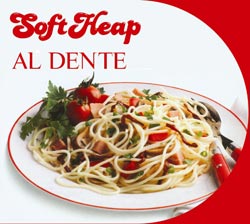Home » Jazz Articles » Multiple Reviews » Elton Dean / Steve Miller Trio / Soft Heap: British genre-benders
Elton Dean / Steve Miller Trio / Soft Heap: British genre-benders
 Steve Miller
Steve Miller The Steve Miller Trio meets Elton Dean
Reel Recordings
2008
Steve Miller, pianist brother of guitarist Phil Miller (Matching Mole, Hatfield and the North, National Health), was a bit of a loner in British creative music circles. Soprano saxophonist Lol Coxhill was probably his most regular musical partner; they recorded a pair of albums for Caroline in 1971/72 (reissued on Cuneiform) before Miller took a leave of absence from music for almost a decade. Upon returning, he assembled a trio with drummer Eddie Prevost (AMM) and bassist Tony Moore; the emphasis was on free improvisation within a very lyrical setting. Miller curated a series called "Meetings with Remarkable Saxophonists" in the fall of 1985, which found the trio in collusion with Coxhill, Dean, reed player Harrison Smith (District Six) and saxophonist Bobby Wellins. The Steve Miller Trio meets Elton Dean is the first issue of this particular date, containing two lengthy group improvisations as well as a brief 1976 rehearsal with another frequent foil, Pip Pyle, on drums.
The quartet doesn't eschew a loose 4/4 swing even as much as glassy right-hand jabs and heavy-bottom lefts tug at Dean's acrid saxello trills. Naturally, Dean is more unfettered here than within the Softs' rigorous themes. His lines can approach delicate wisps and toy with a winsome melodic fragment like a young Steve Lacy, or spiral upward in bitter-toned arcs. It's unclear whether "Dedicated to Few" is a play on a Hugh Hopper tune or referencing pianist Bobby Few—indeed, at ten minutes in the trio is off at a frantic run that recalls the latter's "Chasing the Piano." A nearly romantic pianist with Coxhill in the 1970s, Miller is positively heavy-handed here, fists and wrists shoving the music and alternately nudging and washing over the saxophonist as the trio wring every last ounce of music out of their instruments (not that there isn't a Bud Powell quote here and there).
Dean, especially on saxello, has always had a rather thin sound and does get somewhat buried as Prevost, Miller and Moore build a head of steam, matter hurtling forward. It's in the sparser moments, though, that his pinched circular breathing, crystalline baubles, and dusky Arabic keen hold breathy weight—as on the languid "Bishop of Stortford." The trio's flights are many and they're easily touched off, but it's clear that Dean's sound world is the impetus for much of the motion here. Soft Heap
Soft Heap
Al Dente
Reel Recordings
2008
Soft Heap was a brief post-Softs project featuring Dean and Softs bassist Hugh Hopper alongside drummer Pip Pyle (Gong, Hatfield and the North, National Health, Delivery) and keyboardist Alan Gowen. Apart from a single and somewhat scarce LP on Charly, this 1978 concert recording is the only documentation of the quartet's work (though some song titles are misidentified). Far from the anthemic minimalism and fuzzed-out squall of the Softs' suites, Soft Heap explores form with a looser, almost journeyman approach.
Dean's "Fara" is shockingly simple as a slightly saccharine ballad, yet the altoist's phrasing finds an oddly metallic affinity with Johnny Hodges. The rhythm section picks up the pace as Dean digs in and builds into cadenzas and shouts in some of his most thrilling choruses on record. Gowen's bluesy turns and frantic runs imply a tonal sensibility more acoustic than electric, far beyond the phased pulse of his instrument. The pianist's "Sleeping House" is significantly more jagged, Pyle hacking and bashing away behind Gowen's punchy left hand and Dean's shenai-like intonation. The drummer's constantly inverted lope is both whirlwind release and unrelenting tension, rhythmic complexity that was key in the open-ended "rock" bands he drove. Pyle constructs a web of tom work behind wispy piano and saxello phasing on "Circle Line," a continual heaping of rhythm and motion atop lyricism, driving the group towards ferocious knots and relentless motoring at its most Softs-like.
Ultimately, Soft Heap tow a line closer to jazz than the Soft Machine ever did, and could only be called fusion by the fact that they plugged in their instruments. Gowen's soloing belies an acoustic approach within the clothing of gadgetry. Hopper's unaccompanied sonic explorations couldn't happen without plugging in, even as his outlines behind soloists both drone and sketch swing. This is liberated, lyrical jazz that uses its cords to advantage.
Tracks and Personnel
The Steve Miller Trio Meets Elton Dean
Tracks: Dedicated to Few; Bishop of Stortford; One for Three.
Personnel: Elton Dean: alto saxophone and saxello; Steve Miller: piano; Tony Moore: bass (1, 2); Eddie Prevost: drums (1, 2); Pip Pyle: drums (3).
Al Dente
Tracks: Fara; Sleeping House; Circle Line; Remain So; C.R.R.C.; Seven for Lee.
Personnel: Elton Dean: alto saxophone and saxello; Alan Gowen: keyboards; Hugh Hopper: electric bass; Pip Pyle: drums.
< Previous
Jazz em Agosto 2008: Days 4-6
Next >
Just This Once
Comments
Tags
For the Love of Jazz
 All About Jazz has been a pillar of jazz since 1995, championing it as an art form and, more importantly, supporting the musicians who create it. Our enduring commitment has made "AAJ" one of the most culturally important websites of its kind, read by hundreds of thousands of fans, musicians and industry figures every month.
All About Jazz has been a pillar of jazz since 1995, championing it as an art form and, more importantly, supporting the musicians who create it. Our enduring commitment has made "AAJ" one of the most culturally important websites of its kind, read by hundreds of thousands of fans, musicians and industry figures every month.


















